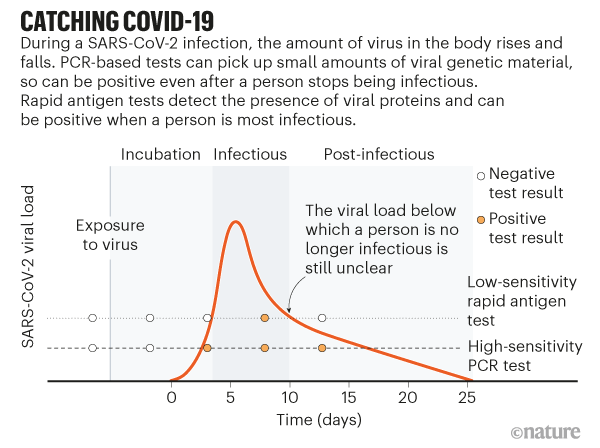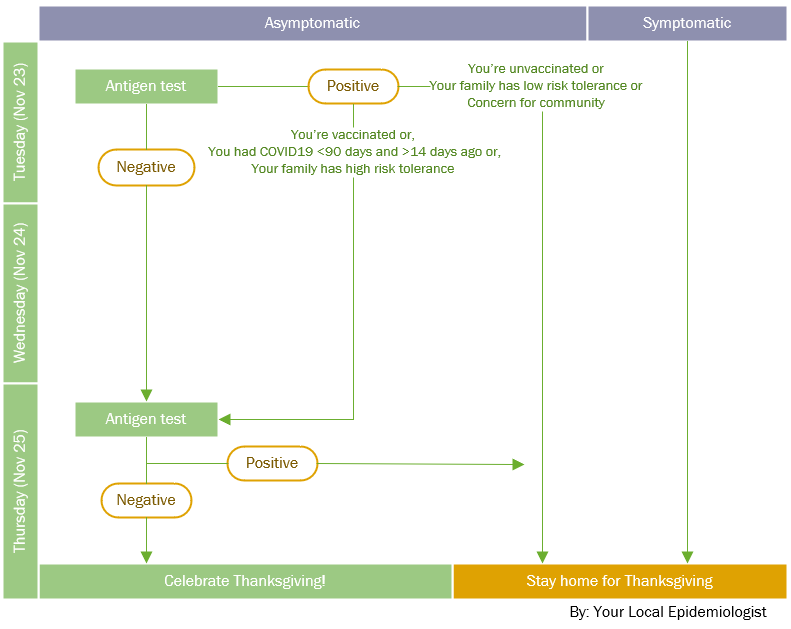Thanksgiving is this week. The best thing you can do for your health, the health of your family, and the health of the community is to test for COVID19 before gathering.
By now, everyone is familiar with PCR tests. They are the gold standard and includes driving to a clinic, getting tested, and waiting a few days for results. While PCR tests are incredibly accurate, they are very expensive. They are also not very feasible. Unless you quarantine after a PCR, you’re not in a bubble. You can become infected while waiting for results. Also, they are certainly not useful for day-of decision making. Antigen tests are your best bet this week.
What are antigen tests?
Antigen tests (or also called rapid tests) are one of the best and most underutilized tools of this pandemic. Antigen tests detect SARS-CoV-2 proteins and are very good at picking up on the most infectious people—a window of ~3-10 days after exposure.
While you can get an antigen test at the doctors office or local urgent care, the best perk is that you don’t have to. You can test at home. You can buy them online (Walmart here) or go to your corner pharmacy (they sell out quickly, so you may need to try a few places). While they are cheaper than PCR’s, they are still ridiculously expensive for the average American to use on a weekly basis. I do think they are worth the investment this week.
Accuracy
Antigen tests are great at detecting highly infectious people. If you have the virus and test yourself during the first week of symptoms, you can expect the average antigen test to catch 78% to 97% of cases. If you have the virus and are asymptomatic, this percentage dips to about 44% to 70%. Test performance varies by brand and user.
These figures may sound a bit low, but the reality is not so bleak. When studies report on test performance, they compare antigen tests to PCR tests. PCR tests are incredibly sensitive. Too sensitive sometimes. They pick up many cases with only a whisper of virus left, not enough to be contagious. For Thanksgiving, we only care about cases with tons of virus (i.e. clearly contagious), so rapid tests will get the job done.

But there’s always a possibility of false negatives— meaning your test is negative but you actually have the virus— especially if you’re asymptomatic. Fortunately, these “false negatives” are far less likely when you’re contagious.
There is also the possibility of false positives—meaning your test is positive but you don’t actually have the virus— but this is much more rare. This happens once in every 100 to 200 tests (0.5% to 1%). So if 200 people take a rapid antigen test, 1 or 2 of them will be positive for COVID19 even though they aren’t.
Whether or not a positive test is a accurate depends on the COVID-19 risk level of the person taking the test. To make sense of your own positive test, consider your exposure level:
Do you have symptoms?
Do you have a known COVID19 contact?
Is community transmission rate high? (Check here)
If any of these are “yes” then the likelihood of a false test becomes more and more slim. In other words, the antigen test is probably correct: You have COVID19 and are contagious. Tip: Many false positives are easy to spot because the line is very faint.
Cadence
To improve accuracy (and reduce the number of false positives and negatives), it’s recommended that people conduct at least two tests a week. Regular testing increases the chances of hitting the timing right. This is especially true with asymptomatic people, because without symptoms, you don’t know the optimal window of time for testing. This is actually why manufacturers often include two tests in each box instead of one.
Proposal for Thanksgiving
So, what does antigen testing look like this week? I put together a proposal that you and your family may find useful. This gives you the best chances to ensure that Delta isn’t at Thanksgiving.
This means everyone who wants to attend Thanksgiving takes two antigen tests:
Test on Tuesday at anytime
If this is negative, don’t do anything until Thursday morning.
If this is positive, this is a bit more difficult decision. This could be a true positive, meaning the family member is contagious. Or it could be false positive, which is less likely. What you do with a positive test at this point really depends on: vaccination status, family risk tolerance, number of unvaccinated at the event, etc. The safest and best thing you can do for your family and community is to stay home on Thursday. But, I can certainly see that being vaccinated and asymptomatic and positive at this point is disappointing and frustrating. Vaccinated people clear this virus much faster than unvaccinated people. So, is this test just the beginning or the end of the infectious window? You won’t know unless you take another test two days later…
Test Thursday morning. Everyone takes an antigen test before getting in their car to the event.
If it’s negative, time to celebrate
If it’s positive, stay home. Period.
I hope everyone has a wonderful and safe Thanksgiving week.
Love, YLE and Dr. Chana Davis
Dr. Chana Davis, PhD is a brilliant scientist in Canada whose expertise lies in genetics, biomarkers, and diagnostics. She helped make sense of all the scientific literature on COVID19 antigen tests. She can be found at @fueledbyscience on Facebook, Insta, and Twitter.
“Your Local Epidemiologist (YLE)” is written by Dr. Katelyn Jetelina, MPH PhD— an epidemiologist, biostatistician, professor, researcher, wife, and mom of two little girls. During the day she has a research lab and teaches graduate-level courses, but at night she writes this newsletter. Her main goal is to “translate” the ever-evolving public health science so that people will be well-equipped to make evidence-based decisions, rather than decisions based in fear. This newsletter is free thanks to the generous support of fellow YLE community members. To support the effort, please subscribe here:





Can you explain why fully vaccinated people shouldn't get tested? That makes no sense to me. You still have a gathering of people from multiple communities that are then going back into their respective areas. Asymptomatic spreaders seem to be an obvious concern here.
The rapid tests appear to be FSA eligible, so if your employer has a flexspend benefit, you're in luck. Of course this is ludicrously regressive (if your marginal tax rate is 25%, you're basically getting a 25% rebate on the test from the IRS).